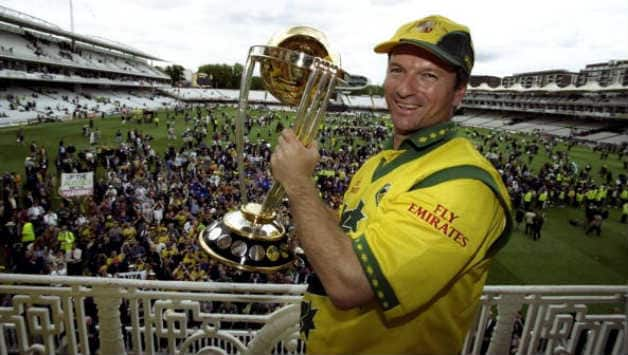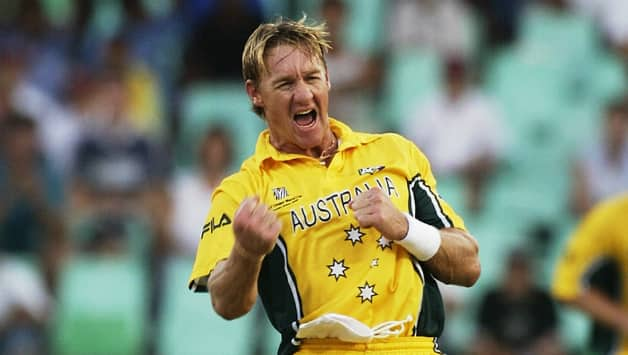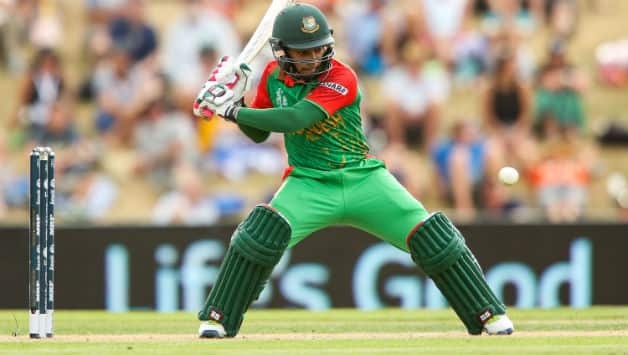Wikipedia has listed Steve as ''twin" brother of Mark, though they are not identical as Nikki Bella and Brie Bella. Lol
ODI World Cup Draft | Tournament underway
- Thread starter Gaurav_7
- Start date
B
Bigby Wolf
Guest
AliB
ICC President
India
AFG...
Mumbai Indians
PlanetCricket Award Winner
Adelaide Strikers
X Rebels
Ah! According to my sense of facial recognition, I found it tough to pick the perfect image.
- Joined
- Sep 3, 2011
Steve Waugh

Waugh holding aloft the 1999 World Cup trophy as the victorious captain.
Having been overshadowed by his twin brother Mark at one point and his career hanging in the balance, only to turn his fortunes around, become one of the leading batsmen of his generation and at one point even hold the all-time record for most test caps, Steve Waugh is a true embodiment of Australian grit.
Despite his success in the longer format of the game, his performances under pressure in World Cups are what earned him the moniker 'The Iceman', and it's not difficult to see why...
Most would say that the big break in Waugh's career came during the 1987 World Cup where his batting composure in the closing overs and tight death bowling first clinched a nail-biting 1-run victory over India in the opening match. His next game came against Zimbabwe where he scored 5 runs shy of a half-century and then went on bowl a miserly six overs for only seven runs to help Australia to a comfortable 96 run victory.
He followed this up with even more heroics against New Zealand where he was given the ball for the last over with the Kiwis requiring 7 runs to win. He saw his team home, only conceding 3 and taking two wickets in the final over!
Playing all the way to the final, he played a pivotal role yet again in the closing overs where he took the wickets of Allan Lamb and Phil DeFreitas dealing a massive blow to the England run-chase. He finished the tournament having totted up a total of 167 runs averaging 55.66 and 11 wickets at 26.18.
More than 10 years on, despite in the meantime having been forced to give up his bowling due to back problems, Waugh returned to the World Cup as the new ODI captain, overseeing the plan for a more modern Australian team which was vindicated as Australia became World Champions for the second time, kickstarting the legendary treble streak of World Cup victories. With this, he and Tom Moody became the first ever Australians to win the tournament twice.
A true great of the game, he pushed on through adversity and roadblocks to forge a successful career that will be remembered fondly, not least for his World Cup performances, but also for the infamous put-down 'You've just dropped the World Cup', which he never actually said!
After having played two World Cups, he remains Australia's fifth highest run-scorer in the history of the tournament and also their sixth highest wicket-taker.
World Cup Record:
Played: 33
Innings: 30
Runs: 978
High Score: 120 no
Average: 48.90
Strike Rate: 81.02
Centuries: 1
Fifties: 6
El Loco's XI:
1.
2.
3.
4.
5. Steve Waugh
6.
7.
8.
9.
10.
11

Waugh holding aloft the 1999 World Cup trophy as the victorious captain.
Having been overshadowed by his twin brother Mark at one point and his career hanging in the balance, only to turn his fortunes around, become one of the leading batsmen of his generation and at one point even hold the all-time record for most test caps, Steve Waugh is a true embodiment of Australian grit.
Despite his success in the longer format of the game, his performances under pressure in World Cups are what earned him the moniker 'The Iceman', and it's not difficult to see why...
Most would say that the big break in Waugh's career came during the 1987 World Cup where his batting composure in the closing overs and tight death bowling first clinched a nail-biting 1-run victory over India in the opening match. His next game came against Zimbabwe where he scored 5 runs shy of a half-century and then went on bowl a miserly six overs for only seven runs to help Australia to a comfortable 96 run victory.
He followed this up with even more heroics against New Zealand where he was given the ball for the last over with the Kiwis requiring 7 runs to win. He saw his team home, only conceding 3 and taking two wickets in the final over!
Playing all the way to the final, he played a pivotal role yet again in the closing overs where he took the wickets of Allan Lamb and Phil DeFreitas dealing a massive blow to the England run-chase. He finished the tournament having totted up a total of 167 runs averaging 55.66 and 11 wickets at 26.18.
More than 10 years on, despite in the meantime having been forced to give up his bowling due to back problems, Waugh returned to the World Cup as the new ODI captain, overseeing the plan for a more modern Australian team which was vindicated as Australia became World Champions for the second time, kickstarting the legendary treble streak of World Cup victories. With this, he and Tom Moody became the first ever Australians to win the tournament twice.
A true great of the game, he pushed on through adversity and roadblocks to forge a successful career that will be remembered fondly, not least for his World Cup performances, but also for the infamous put-down 'You've just dropped the World Cup', which he never actually said!
After having played two World Cups, he remains Australia's fifth highest run-scorer in the history of the tournament and also their sixth highest wicket-taker.
World Cup Record:
Played: 33
Innings: 30
Runs: 978
High Score: 120 no
Average: 48.90
Strike Rate: 81.02
Centuries: 1
Fifties: 6
El Loco's XI:
1.
2.
3.
4.
5. Steve Waugh
6.
7.
8.
9.
10.
11
Steve Waugh is a gun pick especially considering you were the last one to pick in this round! His bowling in the WCs is what was more surprising. He has great figures in it. Very nice. Loco you can get us started with the Bangladesh pick too.
Okay, time to spill the beans..
 Andy Bichel
Andy Bichel

Surprised? Well, you ought to be. Nobody in their right mind could have predicted what a superb all-round option Bichel would turn out to be in the 2003 World Cup, a tournament in which he averaged an unbelievable 117 with the bat from 3 innings in the competition, and claimed 16 wickets at an astonishing average of 12.31, all while conceding runs at just 3.45 per over. Sir Donald Bradman was fortunate to have passed away 2 years previously, or he might have died of jealousy right on the spot!
His top performances included:
7 for 20 (10), 34* off 36 balls vs England
England had gotten off to a flying start with the bat posting 66 in their first 10 overs courtesy of Nick Knight and Marcus Trescothick, one of their better opening pairs in ODI cricket. For the first time in ages, they had managed to give the Aussies somewhat of a scare in the ODI format after years of getting flogged on a regular basis. Enter Andy Bichel (who only played because Jason Gillespie was out injured). By the end of his spell, he had claimed a mind boggling 7 for 20 off 10 overs dismissing Knight, Vaughan, Hussain, Stewart, Collingwood, Flintoff and Giles - pretty much everyone who was anyone in that England lineup to see them finish with an underwhelming 204/8 at the end of 50 overs.
But that wasn't the end of it, oh no. England's bowling attack led by Andy Caddick had reduced Australia to 135/8 still needing another 70 runs for victory with only one specialist batsman in Michael Bevan at the crease. Any other team, under any other circumstances would have capitulated right there on the spot and lost by a good 50 runs or so. But not this Australian lineup with Bichel in it. He went on to add an unbeaten 73-run stand with Bevan and scored 34* off 36 balls, while the former finished on 74 off 126 at the other end as Australia completed one of their most memorable World Cup victories.
64 off 83 balls, 5-0-15-1 vs New Zealand
Australia, having won all six of their group matches started this Super Six match as favorites. New Zealand had a knack of competing well against them in World Cups, but generally fell short in crunch moments. Today however seemed different with Shane Bond at his very best sending down his 145-150 kph thunderbolts and reducing them to a pathetic 84/7 by the 27th over. Never before had New Zealand dominated their bigger Trans-Tasman rivals in such ruthless fashion. Skipper Stephen Fleming however decided to bowl out Bond by the 29th over, seeing him finish with amazing bowling figures of 6 for 23 off 10 overs against arguably the strongest lineup of the competition.
He was made to regret his decision with Bichel and Bevan coming to the rescue yet again with a 97-run partnership for the 9th wicket. The rest of the New Zealand bowling lineup appeared powerless to stop these two just like the English before them, and Australia finished with a total of 208 after 50 overs to give themselves a fair chance in what was previously a no contest. New Zealand capitulated for 112 in response, with Brett Lee claiming 5 for 42 off 9.1 overs to see Australia complete another great come-from-behind victory in the tournament. Bichel did his bit with the ball by claiming the crucial wicket of Chris Cairns, New Zealand's most destructive batsman and the man who had almost single-handedly won them the 2000 ICC Knockout Cup final against India with the bat three years previously.
-
Bichel finished third on wickets behind Brett Lee (22 at 17.90) and Glenn McGrath (21 at 14.76) for Australia in the competition, but with the best average for any bowler who claimed more than 10 wickets in the competition. His batting average of 117, helped by two not outs from just 3 innings in the competition was second best overall behind fellow team-mate Andrew Symonds who finished with an average of 163. Say what you will regarding his overall stats or the fact that he played in just one World Cup, but you'd be hard pressed to find figures like that in any World Cup or for that matter any ODI competition.
I rest my case.

Surprised? Well, you ought to be. Nobody in their right mind could have predicted what a superb all-round option Bichel would turn out to be in the 2003 World Cup, a tournament in which he averaged an unbelievable 117 with the bat from 3 innings in the competition, and claimed 16 wickets at an astonishing average of 12.31, all while conceding runs at just 3.45 per over. Sir Donald Bradman was fortunate to have passed away 2 years previously, or he might have died of jealousy right on the spot!
His top performances included:
7 for 20 (10), 34* off 36 balls vs England
England had gotten off to a flying start with the bat posting 66 in their first 10 overs courtesy of Nick Knight and Marcus Trescothick, one of their better opening pairs in ODI cricket. For the first time in ages, they had managed to give the Aussies somewhat of a scare in the ODI format after years of getting flogged on a regular basis. Enter Andy Bichel (who only played because Jason Gillespie was out injured). By the end of his spell, he had claimed a mind boggling 7 for 20 off 10 overs dismissing Knight, Vaughan, Hussain, Stewart, Collingwood, Flintoff and Giles - pretty much everyone who was anyone in that England lineup to see them finish with an underwhelming 204/8 at the end of 50 overs.
But that wasn't the end of it, oh no. England's bowling attack led by Andy Caddick had reduced Australia to 135/8 still needing another 70 runs for victory with only one specialist batsman in Michael Bevan at the crease. Any other team, under any other circumstances would have capitulated right there on the spot and lost by a good 50 runs or so. But not this Australian lineup with Bichel in it. He went on to add an unbeaten 73-run stand with Bevan and scored 34* off 36 balls, while the former finished on 74 off 126 at the other end as Australia completed one of their most memorable World Cup victories.
64 off 83 balls, 5-0-15-1 vs New Zealand
Australia, having won all six of their group matches started this Super Six match as favorites. New Zealand had a knack of competing well against them in World Cups, but generally fell short in crunch moments. Today however seemed different with Shane Bond at his very best sending down his 145-150 kph thunderbolts and reducing them to a pathetic 84/7 by the 27th over. Never before had New Zealand dominated their bigger Trans-Tasman rivals in such ruthless fashion. Skipper Stephen Fleming however decided to bowl out Bond by the 29th over, seeing him finish with amazing bowling figures of 6 for 23 off 10 overs against arguably the strongest lineup of the competition.
He was made to regret his decision with Bichel and Bevan coming to the rescue yet again with a 97-run partnership for the 9th wicket. The rest of the New Zealand bowling lineup appeared powerless to stop these two just like the English before them, and Australia finished with a total of 208 after 50 overs to give themselves a fair chance in what was previously a no contest. New Zealand capitulated for 112 in response, with Brett Lee claiming 5 for 42 off 9.1 overs to see Australia complete another great come-from-behind victory in the tournament. Bichel did his bit with the ball by claiming the crucial wicket of Chris Cairns, New Zealand's most destructive batsman and the man who had almost single-handedly won them the 2000 ICC Knockout Cup final against India with the bat three years previously.
-
Bichel finished third on wickets behind Brett Lee (22 at 17.90) and Glenn McGrath (21 at 14.76) for Australia in the competition, but with the best average for any bowler who claimed more than 10 wickets in the competition. His batting average of 117, helped by two not outs from just 3 innings in the competition was second best overall behind fellow team-mate Andrew Symonds who finished with an average of 163. Say what you will regarding his overall stats or the fact that he played in just one World Cup, but you'd be hard pressed to find figures like that in any World Cup or for that matter any ODI competition.
I rest my case.
Last edited:
One could actually form a pretty decent XI out of some of the Aussie players that have missed the cut here.
 David Boon (815 runs at 54.33 from 16 matches)
David Boon (815 runs at 54.33 from 16 matches)
 Shane Watson (643 runs at 53.58; 9 wickets at 62.88 from 22 matches)
Shane Watson (643 runs at 53.58; 9 wickets at 62.88 from 22 matches)
 Steven Smith (455 runs at 56.87 from 14 matches)
Steven Smith (455 runs at 56.87 from 14 matches)
 Dean Jones (590 runs at 42.14 from 16 matches)
Dean Jones (590 runs at 42.14 from 16 matches)
 Andrew Symonds (515 runs at 103.00; 5 wickets at 51.60 from 18 matches)
Andrew Symonds (515 runs at 103.00; 5 wickets at 51.60 from 18 matches)
 Glenn Maxwell (324 runs at 64.80 and a strike rate of 182! 6 wickets at 36.33 from 8 matches)
Glenn Maxwell (324 runs at 64.80 and a strike rate of 182! 6 wickets at 36.33 from 8 matches)
 Brad Haddin (458 runs at 50.88 from 15 matches)
Brad Haddin (458 runs at 50.88 from 15 matches)
 Andy Bichel (16 wickets at 12.31; 117 runs at 117.00 from 8 matches)
Andy Bichel (16 wickets at 12.31; 117 runs at 117.00 from 8 matches)
 Brad Hogg (34 wickets at 19.23; 87 runs at 17.40 from 21 matches)
Brad Hogg (34 wickets at 19.23; 87 runs at 17.40 from 21 matches)
 Craig McDermott (27 wickets at 22.18 from 17 matches)
Craig McDermott (27 wickets at 22.18 from 17 matches)
 Shaun Tait (34 wickets at 21.50 from 18 matches)
Shaun Tait (34 wickets at 21.50 from 18 matches)
12th man: Mitchell Johnson (25 wickets at 22.28 from 15 matches)
12th man: Mitchell Johnson (25 wickets at 22.28 from 15 matches)
- Joined
- Sep 3, 2011
Shakib Al Hasan

Who else was I gonna go for really???
Bangladesh's premier all-rounder for over a decade now, Shakib is not only the greatest Bangladeshi cricketer but also undoubtedly the country's best athlete of all time.
As a fresh-faced 19 year old from Magura, he burst onto the scene at the 2007 World Cup as part of the Bangladesh team that finally came of age as they shocked the cricketing world and forced them to stand up and take notice as they beat India by 5 wickets in the group stages, thereby playing a massive role in the booting of one of the favourites straight out of the tournament before the knock-outs had even begun. He announced himself on the biggest stage by scoring an assured half-century, sending his team on their way to a monumental victory. After another sensational victory against World Number 1's South Africa, Bangladesh were later knocked out by England. Despite this Shakib also added another half-century during his first World Cup stint.
Shakib's rapid rise continued after the World Cup and he began to hone his ability as a bowler as well as a batsman, within a couple years he would become his team's leading all-rounder and he was appointed captain shortly thereafter.
The next World Cup came around in 2011 and Shakib's home country became co-hosts for the tournament. However they were largely disappointing. Despite recording a win over England, the only other victories they managed under Shakib's captaincy were an unconvincing one against Ireland and also a win over the Netherlands. After having faced a lot of outcry from fans about the way he handled himself in his role, his tenure as captaincy did not last long after their swift exit from the tournament. Despite this he still finished as Bangladesh's leading wicket taker with 8 wickets at an average of 27.87 and his 142 runs from 6 innings made him the team's third highest run-scorer.
Four years later, a whole different Shakib Al Hasan returned to the 2015 World Cup in Australia and New Zealand. A month before, he had become the first ever cricketer to become the number 1 ranked all-rounder in all three formats of the game. Without the pressure of captaincy and being the only man in the squad to have have played cricket in Australia in the months leading up to the tournament, Bangladesh expected big things from him...and he hit the ground running!
In their first opening game against Afghanistan, he walloped 63 off just 51 balls and in the process became the first ever Bangladeshi to cross the 4000 run mark in ODIs. From then on he continued to impress with that bat in the subsequent games. His bowling then shone through in the last group stage match against New Zealand where he took 4/55 despite a very narrow loss to the co-hosts, but Bangladesh's place in the quarters and their best ever World Cup finish was booked regardless.
After Bangladesh's exit by India, Shakib Al Hasan finished with a run tally of 196 at 39.20 and 8 wickets, thereby making him the top Bangladeshi run-scorer and wicket-taker of all time in World Cups.
Shakib's performances in this World Cup played a massive role in kickstarting arguably the best year ever for Bangladeshi cricket.
World Cup Record:
Played: 21
Innings: 21
Runs: 540
High Score: 63
Average: 30.00
Strike Rate: 70.86
Centuries: 0
Fifties: 5
Overs: 164.5
Runs: 823
Wickets: 23
Best: 4/55
Average: 35.78
Economy: 4.99
Strike Rate: 43.0
El Loco's XI:
1.
2.
3.
4.
5. Steve Waugh
6. Shakib Al Hasan
7.
8.
9.
10.
11

Who else was I gonna go for really???
Bangladesh's premier all-rounder for over a decade now, Shakib is not only the greatest Bangladeshi cricketer but also undoubtedly the country's best athlete of all time.
As a fresh-faced 19 year old from Magura, he burst onto the scene at the 2007 World Cup as part of the Bangladesh team that finally came of age as they shocked the cricketing world and forced them to stand up and take notice as they beat India by 5 wickets in the group stages, thereby playing a massive role in the booting of one of the favourites straight out of the tournament before the knock-outs had even begun. He announced himself on the biggest stage by scoring an assured half-century, sending his team on their way to a monumental victory. After another sensational victory against World Number 1's South Africa, Bangladesh were later knocked out by England. Despite this Shakib also added another half-century during his first World Cup stint.
Shakib's rapid rise continued after the World Cup and he began to hone his ability as a bowler as well as a batsman, within a couple years he would become his team's leading all-rounder and he was appointed captain shortly thereafter.
The next World Cup came around in 2011 and Shakib's home country became co-hosts for the tournament. However they were largely disappointing. Despite recording a win over England, the only other victories they managed under Shakib's captaincy were an unconvincing one against Ireland and also a win over the Netherlands. After having faced a lot of outcry from fans about the way he handled himself in his role, his tenure as captaincy did not last long after their swift exit from the tournament. Despite this he still finished as Bangladesh's leading wicket taker with 8 wickets at an average of 27.87 and his 142 runs from 6 innings made him the team's third highest run-scorer.
Four years later, a whole different Shakib Al Hasan returned to the 2015 World Cup in Australia and New Zealand. A month before, he had become the first ever cricketer to become the number 1 ranked all-rounder in all three formats of the game. Without the pressure of captaincy and being the only man in the squad to have have played cricket in Australia in the months leading up to the tournament, Bangladesh expected big things from him...and he hit the ground running!
In their first opening game against Afghanistan, he walloped 63 off just 51 balls and in the process became the first ever Bangladeshi to cross the 4000 run mark in ODIs. From then on he continued to impress with that bat in the subsequent games. His bowling then shone through in the last group stage match against New Zealand where he took 4/55 despite a very narrow loss to the co-hosts, but Bangladesh's place in the quarters and their best ever World Cup finish was booked regardless.
After Bangladesh's exit by India, Shakib Al Hasan finished with a run tally of 196 at 39.20 and 8 wickets, thereby making him the top Bangladeshi run-scorer and wicket-taker of all time in World Cups.
Shakib's performances in this World Cup played a massive role in kickstarting arguably the best year ever for Bangladeshi cricket.
World Cup Record:
Played: 21
Innings: 21
Runs: 540
High Score: 63
Average: 30.00
Strike Rate: 70.86
Centuries: 0
Fifties: 5
Overs: 164.5
Runs: 823
Wickets: 23
Best: 4/55
Average: 35.78
Economy: 4.99
Strike Rate: 43.0
El Loco's XI:
1.
2.
3.
4.
5. Steve Waugh
6. Shakib Al Hasan
7.
8.
9.
10.
11
Hey these can be picked in the last round so don't give any clues yet!One could actually form a pretty decent XI out of some of the Aussie players that have missed the cut here.
David Boon (815 runs at 54.33 from 16 matches)
Shane Watson (643 runs at 53.58; 9 wickets at 62.88 from 22 matches)
Steven Smith (455 runs at 56.87 from 14 matches)
Dean Jones (590 runs at 42.14 from 16 matches)
Andrew Symonds (515 runs at 103.00; 5 wickets at 51.60 from 18 matches)
Glenn Maxwell (324 runs at 64.80 and a strike rate of 182! 6 wickets at 36.33 from 8 matches)
Brad Haddin (458 runs at 50.88 from 15 matches)
Andy Bichel (16 wickets at 12.31; 117 runs at 117.00 from 8 matches)
Brad Hogg (34 wickets at 19.23; 87 runs at 17.40 from 21 matches)
Craig McDermott (27 wickets at 22.18 from 17 matches)
Shaun Tait (34 wickets at 21.50 from 18 matches)
12th man: Mitchell Johnson (25 wickets at 22.28 from 15 matches)
 [DOUBLEPOST=1538597511][/DOUBLEPOST]Bangladesh round is going to be very interesting. A no brainer first pick really.
[DOUBLEPOST=1538597511][/DOUBLEPOST]Bangladesh round is going to be very interesting. A no brainer first pick really.This is the toughest round and me being 2nd last to pick, my head will hurt a lot finding a good player.[DOUBLEPOST=1538626392][/DOUBLEPOST]@Ashutosh. Your turn.
Mahmudullah Riyad. That's an interesting pick. I didn't know he had a very good WC record.
Ashutosh.
Staff Member
Moderator
Sportsbookie
Fantasy Cricket Team
PlanetCricket Award Winner
Survival Games Finalist
TPCL Titans
Mashrafe Mortaza

*Write your own content*
Ashutosh's WC XI -
1.
2.
3.
4.
5.
6.
7.
8.
9. Brett Lee
10. Mashrafe Mortaza
11.
Last edited by a moderator:
B
Bigby Wolf
Guest

MUSHFIQUR RAHIM
Rahim's World cup stats
Matches: 21
Innings: 20
Runs:510
Average: 31.86
High Score:87
50s/100s:4/0
Bigby's WC XI -
1.
2.
3.
4.
5. Mushfiqur Rahim
6.
7.
8. Mitchell Starc
9.
10.
11.
Similar threads
Users who are viewing this thread
Total: 2 (members: 0, guests: 2)
















